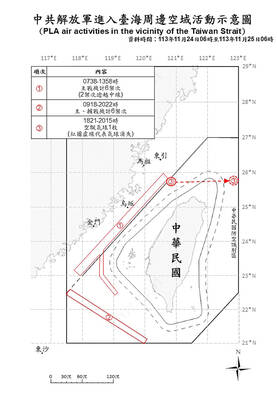Green iguanas, along with 13 native species and other non-native species, have been added to the Forestry Bureau’s list of animals that must be officially registered if they are to be kept and bred.
The iguanas are “exotic wildlife dangerous to the environment, people or animals,” the bureau said on Thursday amid growing concerns over the damage the lizards are doing to the environment when released into the wild.
Green iguanas, which are indigenous to South and Central America, have become popular pets in Taiwan and other nations, but the bureau said that many people in Taiwan who find themselves unable or unwilling to care for them have abandoned them in the wild.

Photo: Chen Wen-chan, Taipei Times
However, without natural predators in the nation, their numbers have quickly grown, causing agricultural losses and damage to roads and riverbanks, the bureau said.
According to the Wildlife Conservation Act (野生動物保育法) an official permit is required before any of the animals on the list can be imported, sold or displayed.
Those who have been raising green iguanas or any of the other species on the list must register them with their local governments from Tuesday next week to Nov. 30 or be fined NT$10,000 to NT$60,000 and face the loss of the creature.
The bureau said it has modified the list based on discussions with experts earlier this year and taking into account the results of monitoring species in the wild, and the threat and commercial exploitation the animals face.
Among the native species added to the list are the endangered Chinese box turtle and seven types of birds, including the yellow-breasted bunting, Taiwan rosefinch and collared bush-robin, while the non-native species include the Chinese crocodile lizard, the pig-nosed turtle and the black-breasted leaf turtle, the bureau said.
However, 19 species were removed from the list, as their wild populations in Taiwan have shown stable growth, including Latham’s snipe, it said.

A decision to describe a Chinese Ministry of Foreign Affairs statement on Singapore’s Taiwan policy as “erroneous” was made because the city-state has its own “one China policy” and has not followed Beijing’s “one China principle,” Deputy Minister of Foreign Affairs Tien Chung-kwang (田中光) said yesterday. It has been a longstanding practice for the People’s Republic of China (PRC) to speak on other countries’ behalf concerning Taiwan, Tien said. The latest example was a statement issued by the PRC after a meeting between Singaporean Prime Minister Lawrence Wong (黃循財) and Chinese President Xi Jinping (習近平) on the sidelines of the APEC summit

Taiwan’s passport ranked 34th in the world, with access to 141 visa-free destinations, according to the latest update to the Henley Passport Index released today. The index put together by Henley & Partners ranks 199 passports globally based on the number of destinations holders can access without a visa out of 227, and is updated monthly. The 141 visa-free destinations for Taiwanese passport holders are a slight decrease from last year, when holders had access to 145 destinations. Botswana and Columbia are among the countries that have recently ended visa-free status for Taiwanese after “bowing to pressure from the Chinese government,” the Ministry

HEALTHCARE: Following a 2022 Constitutional Court ruling, Taiwanese traveling overseas for six months would no longer be able to suspend their insurance Measures allowing people to suspend National Health Insurance (NHI) services if they plan to leave the country for six months would be abolished starting Dec. 23, NHIA Director-General Shih Chung-liang (石崇良) said yesterday. The decision followed the Constitutional Court’s ruling in 2022 that the regulation was unconstitutional and that it would invalidate the regulation automatically unless the NHIA amended it to conform with the Constitution. The agency would amend the regulations to remove the articles and sections that allow the suspension of NHI services, and also introduce provisional clauses for those who suspended their NHI services before Dec. 23, Shih said. According to

‘GRAY ZONE’ TACTICS: China continues to build up its military capacity while regularly deploying jets and warships around Taiwan, with the latest balloon spotted on Sunday The US is drawing up contingency plans for military deployments in Japan and the Philippines in case of a Taiwan emergency, Japan’s Kyodo news agency reported. They would be incorporated in a first joint operation plan to be formulated in December, Kyodo reported late on Sunday, citing sources familiar with Japan-US relations. A US Marine Corps regiment that possesses High Mobility Artillery Rocket Systems — a light multiple rocket launcher — would be deployed along the Nansei Island chain stretching from Kyushu to Yonaguni near Taiwan, Kyodo said. According to US military guidelines for dispatching marines in small formations to several locations,